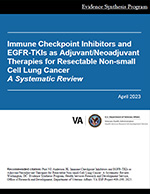
|
Recommended citation: |
Download PDF: Complete Report, Executive Summary, Report, Appendices
Immune checkpoint inhibitors (ICIs) and epidermal growth factor receptor-tyrosine kinase inhibitors (EGFR-TKIs) currently approved for adjuvant use appear to be tolerable to most patients with early non-small cell lung cancer (NSCLC). Despite some remaining uncertainty about overall survival benefits, adjuvant therapy using these agents could be an option for selected patients with resectable NSCLC in addition to the current standard of care. For patients with stage II–IIIA NSCLC, this remains conventional adjuvant chemotherapy after surgical resection. In the neoadjuvant setting, neoadjuvant therapy with the ICI nivolumab plus platinum-based chemotherapy likely improves event-free survival, and may improve overall survival, for patients with resectable NSCLC compared with neoadjuvant chemotherapy alone. Planned analyses of more mature survival data, particularly in important patient subgroups, could help to clarify remaining questions about the use of ICIs and EGFR-TKIs in early NSCLC.
NSCLC is the most common form of lung cancer and as many as 80% of patients present with locally advanced or metastatic disease. ICIs and EGFR-TKIs are important, and relatively recent, advancements in cancer treatment. Clinical trials are investigating whether benefits of ICIs and EGFR-TKIs seen in metastatic NSCLC extend to early and locally advanced disease. To date, an EGFR-TKI (osimertinib) has been approved for use as an adjuvant monotherapy in patients with certain EGFR mutations, while 2 ICIs (atezolizumab and pembrolizumab) have been approved for adjuvant use following adjuvant platinum-based chemotherapy. Another ICI, nivolumab, was recently approved as a neoadjuvant therapy (ie, prior to surgical resection) in combination with neoadjuvant platinum-doublet chemotherapy.
In patients with NSCLC who have received 3–4 cycles of platinum-based chemotherapy after complete surgical resection, adjuvant therapy using the ICIs atezolizumab or pembrolizumab likely improves disease-free survival compared with best supportive care or placebo. For atezolizumab, results of prespecified exploratory analyses from the relevant trial suggest disease-free survival benefit of adjuvant therapy with atezolizumab may be limited to patients with programmed death ligand 1 (PD-L1) expression ≥ 50%, and that adjuvant atezolizumab may also improve overall survival in this population. Overall survival findings are interim and have not yet been formally tested for statistical significance. Overall survival data for pembrolizumab are less mature and have not been reported by PD-L1 expression level.
In patients with resected, EGFR mutation-positive stage II–IIIA NSCLC, adjuvant therapy with EGFR-TKIs likely improves disease-free survival compared with adjuvant chemotherapy or placebo. The most recent and relevant available trial found that adjuvant therapy with osimertinib, a third-generation EGFR-TKI, led to substantially improved disease-free survival over placebo. Overall survival data from this trial are immature, limiting conclusions that can be made about overall survival benefits of adjuvant therapy using recent-generation EGFR-TKIs. ICIs and EGFR-TKIs currently approved for adjuvant use appear to be tolerable to most patients. Despite some remaining uncertainty about overall survival benefits, adjuvant therapy using these agents could be an option for selected patients with early NSCLC in addition to the current standard of care. For patients with stage II–IIIA NSCLC, this remains conventional adjuvant chemotherapy after surgical resection.
In patients with resectable NSCLC, neoadjuvant therapy with the ICI nivolumab plus platinum-based chemotherapy likely improves event-free survival, and may improve overall survival, compared with neoadjuvant chemotherapy alone. Results of prespecified subgroup analyses from the available clinical trial suggest patients with PD-L1 ≥ 50% may experience the largest disease-free survival benefit. Patients with tumors bearing EGFR mutations or anaplastic lymphoma kinase (ALK) rearrangements were excluded from the available trial, which may imply the need to test for these alterations prior to treatment.